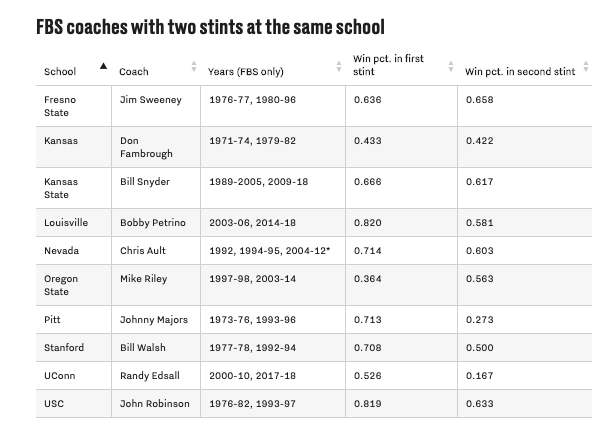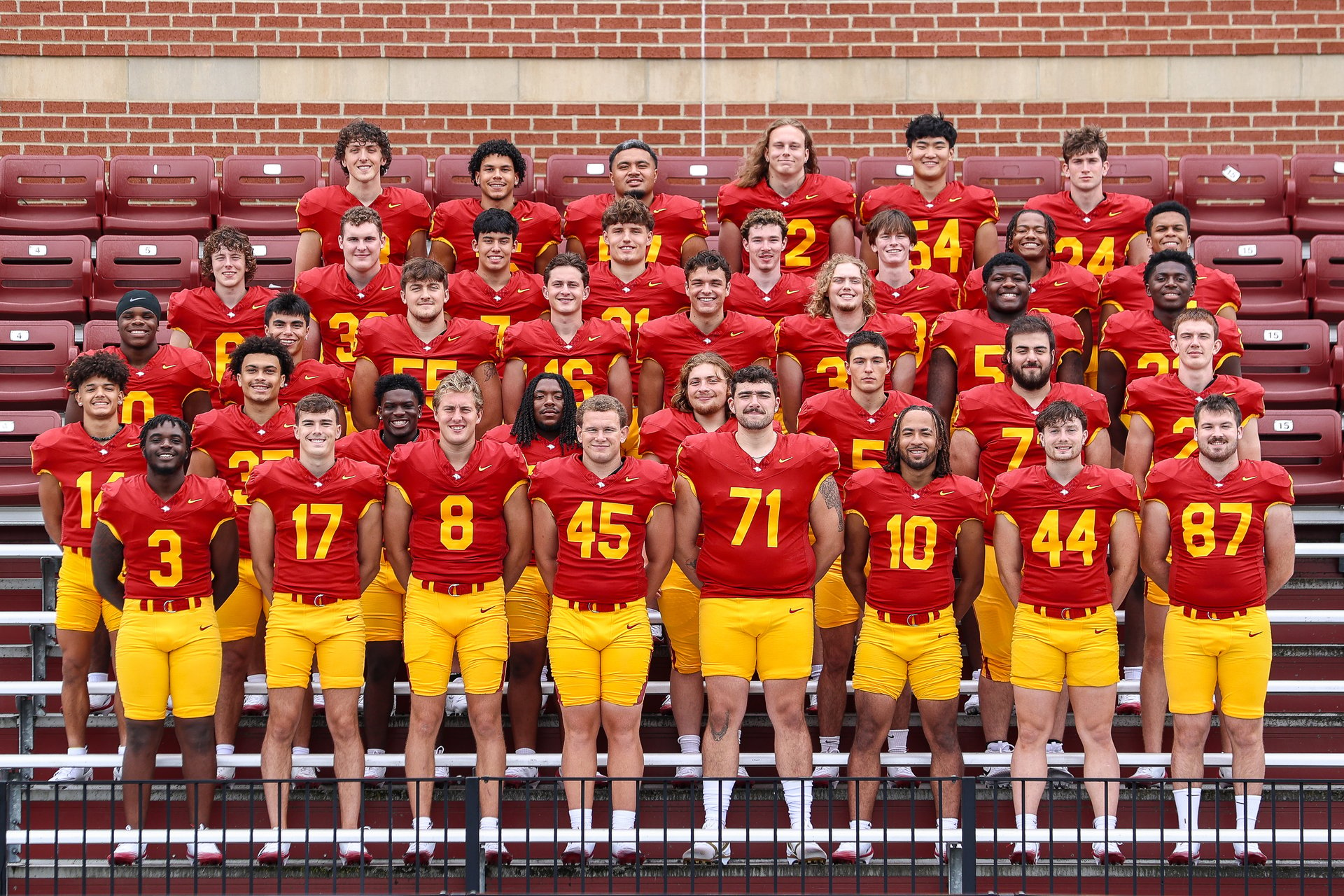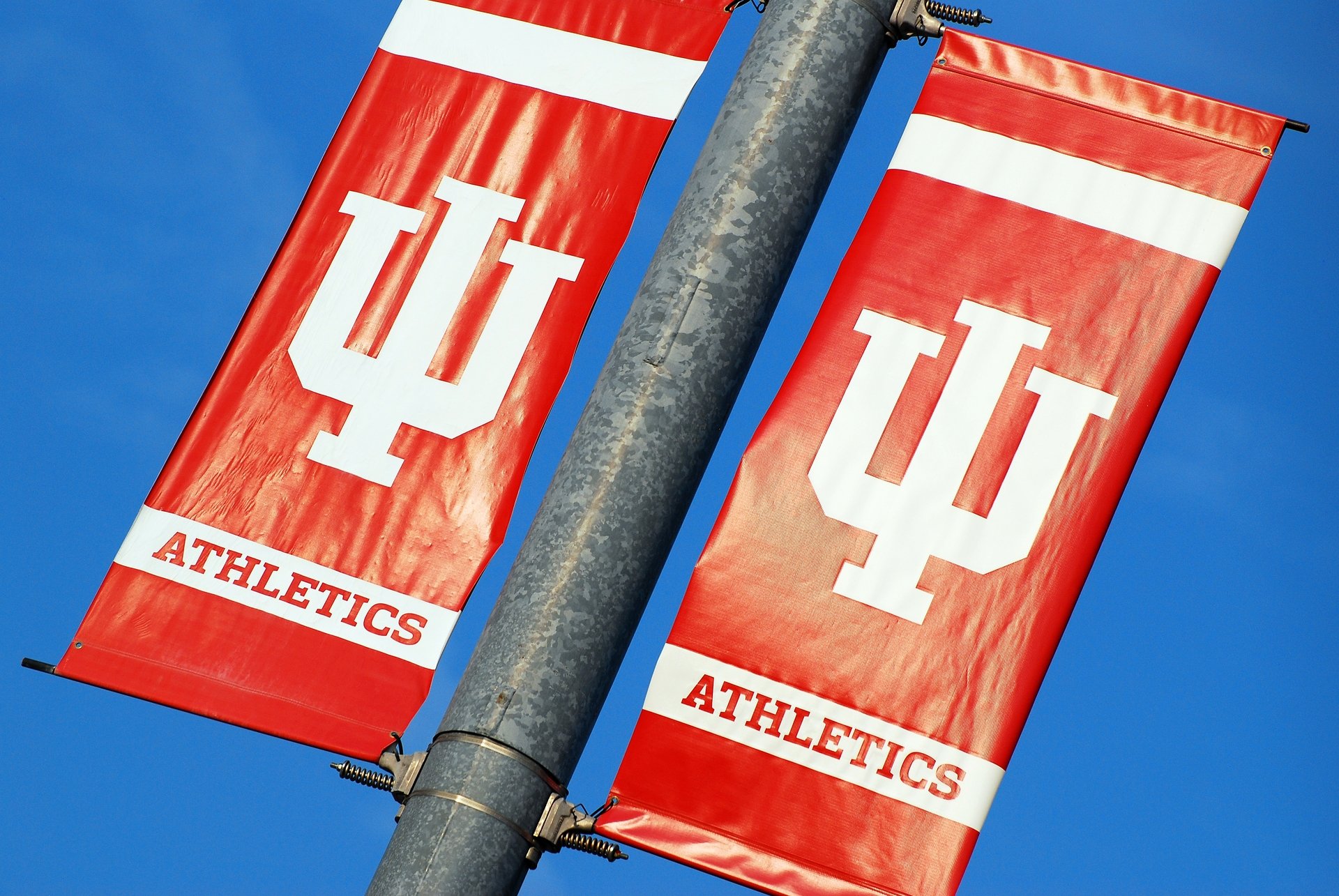Good morning!
Coach firing season keeps creeping up earlier and earlier in the season, it feels like. Here we are on September 30, and we already have not just our first FBS vacancy, but our first Power Five vacancy. After a 52-0 blasting at the hands of Michigan, Rutgers went ahead and fired Chris Ash on Sunday afternoon.
Your interim coach is Nunzio Campanile, the current tight ends coach, and former head coach at Bergen Catholic, a powerhouse high school program in New Jersey. Should Rutgers suddenly rebound this season (uh, not likely), he could be a candidate for the gig, but NJ.com reports some other names are likely to be considered:
Hobbs will oversee an immediate national search for Ash’s replacement, with former Rutgers coach Greg Schiano expected to be a top candidate. Mississippi State coach Joe Moorhead, Buffalo coach Lance Leipold, Pittsburgh coach Pat Narduzzi and Princeton coach Bob Surace are other coaches who are expected to draw interest from Rutgers officials for the job.
If Moorhead and Narduzzi are actually on this list…boy, that sure sounds like they’re worried about their own job security. But that’s probably worth digging into during a different newsletter.
Other potential candidates, per Brett McMurphy:
And Bruce Feldman at The Athletic, while mentioning the search would likely center on Schiano, also mentioned Jones, Jason Candle of Toledo, and Willie Fritz at Tulane, with Moorhead and P.J Fleck of Minnesota as potential wild cards.
Okay, so what the hell should Rutgers actually do?
The way I see it, there are two possible paths for Rutgers here.
The first, and based on those previous two sources, seems to be what Rutgers is actually planning on doing, is to spend some money and bring in an established, experienced coach. The goal is that your “name” coach can go and recruit the hell out of New Jersey, build up the talent level on the roster, and steal enough wins in conference to build a sustainable brand for the program.
I intellectually understand the appeal here. The recruiting potential in New Jersey might be the only real positive Rutgers has going for it. Some of the best prep programs in the country are in the Garden State, and New Jersey is typically good for around ten blue-chip recruits a cycle, plus another dozen plus capable of playing P5 football. The last time (and really, the only time) Rutgers was really good, they were stealing a few of those elite kids.
The last coach to do that, of course, was Greg Schiano, and I’d expect him to be the heavy, heavy favorite to get this gig. But Schiano signed his best classes and had his best success in the Big East, when a fully operational Rutgers had some of the best talent in the conference.
That won’t be the case in the Big Ten East. Even in the best case scenario, where Rutgers steals a few of the top 12 kids in New Jersey and signs a top 30ish recruiting class, they’ll have the maybe the 5th most talent roster in the Big Ten East alone. If they play Wisconsin or Nebraska that season, there’s a good chance Rutgers, even when they’re recruiting very well, will be at a talent disadvantage for at least six games a season. That’s tough.
To quantify that talent disadvantage a bit, let’s take a look at the 247 Team Talent Composite, which measures the recruiting rankings of everybody currently on the roster.
Despite sitting in a pretty fertile recruiting territory, Rutgers currently has the least talented roster in the Big Ten, a few percentage points behind Indiana, which just four blue-chip players. The next lowest ranked Big Ten East team, Michigan State, has thirteen. Maryland has fifteen. Michigan has forty. So you’d need years of excellent classes to even kind of close that gap.
As On The Banks points out, there are other reasons to potentially be skeptical of a Schiano reunion. While his early returns at Ohio State were solid, his last season as DC resulted in one of the worst Ohio State defenses ever. He can be a bit of a challenging personality, and he hasn’t been a college head coach since 2011.
As my friend Bill Connelly pointed out here, coach reunions usually don’t work out that well either.

If history tells us the best case scenario is Mike Riley, maybe don’t make that hire?
Okay smartass, what’s the other option?
The other idea is to completely forget the idea of maximizing recruiting. You will never make the College Football Playoff at Rutgers. You will probably not win a Big Ten title in the next 50 years. Even recruiting lots of great New Jersey kids will probably not win you eight games on even a quasi-regular basis, if all of your conference opponents still have better players.
Instead, you could try to maximize your ability to win as an underdog. You could hire Army head coach Jeff Monken and go run the triple. You could steal one of these new, innovative Ivy League head coaches, ditch tackling at practice, and try to be weird. You could hire Lance Leipold or Eastern Michigan’s Chris Creighton, guys who have experience building consistent identities at hard jobs, and hope for the best.
Because make no mistake about it, this is a hard job. For my money, along with Indiana, it’s probably the worst gig in the Power Five. Sure, you’ve been playing football for 150 years, but you’ve sucked for most of those. The state exports high school students (not just athletes) more than anybody else in the country, and your schedule is murder.
The interesting thing to me, I think, is how much time the new guy gets. I think my pal Michael Felder makes a very good point here:
There are no shortcuts. Rutgers has a few interesting pieces on this roster right now, but they are probably at least three years from a bowl game. Can they be patient and sit through a few more 52-0 beatdowns, in the name of a greater goal? Or have they been clobbered so much (and honestly, need to grow their fan and donor support base) that they need to take a swing and hope for improvement quickly?
I think slow and steady is their best shot at building something meaningful, but I can understand if they might not have that luxury right now.
They’ll probably hire Schiano. It’s not what I would have done, but this job is so hard, Rutgers could still make the right hire and it might not work out anyway.
They’re not the only school that might make a coaching change in the next few weeks.
What about USF?
South Florida hiring Charlie Strong seemed like a home run on paper. Experienced coach with Florida ties coming to a high-ceiling mid-major with an already promising roster? What could possibly go wrong?
A lot, apparently. Via the Daily Stampede:
The Bulls have lost nine straight games to FBS opponents by a combined score of 357-152. Six of those losses have been by at least 18 points. The Bulls have only been within a touchdown during the fourth quarter in two of those nine games.
WOOF.
This season has already been a disaster. The Bulls lost to Georgia Tech, who might not win another game this season, and just got absolutely bodied by SMU. If they can’t beat a BYU team in two weeks that will be playing a backup QB, they very well might only win two games this season.
What happens next is interesting. Strong has a weird buyout situation, since the bulk of his contract is actually tied up in the USF foundation (which is private). The Daily Stampede estimates it would cost between“$4.5 - 5.2 million” to fully buy out the deal.
That’s a lot of money for most programs, but especially for USF. I’ve become convinced that the Bulls are a good example of geography not always equaling destiny in college football.
You’d think that a big school in a good conference in a big city in Florida would automatically be a pretty great college football job, right? But USF has some pretty significant drawbacks. The school doesn’t have an indoor practice facility, a de facto requirement in a place like Tampa where bad weather that could threaten practices is common. There’s no on-campus stadium. You have stricter academic requirements than most of the other AAC schools. And oh yeah, your rival, who was easily your peer just a few years ago, has now completely and utterly lapped you.
Spending big bucks on a coaching buyout, and the salary for a new coach, and trying to fundraise for those needed capital projects may be very tough for a school that simply doesn’t have deep pockets or a deep donor base. Will that be enough to keep Strong around another year? Can they afford not to fire him?
That’s a tough call. It’s hard to see the situation significantly turning itself around this year, and with losable games against UConn and a hobbled BYU on deck, the potential for embarrassment is high.
If the choice is “eat a terrible season but get the football facility done sooner”, or “cut bait and postpone the capital projects and hope that a better coach and spur fundraising”, I’d probably keep the coach. But maybe that’s not exactly what the choice is for USF.
Those aren’t the only schools with potentially tricky choices to make. Beyond the heavyweights like Virginia Tech, Tennessee and USC (I honestly don’t think Florida State can make a change this season), schools like UNLV, New Mexico, Ball State, Colorado State and Tulsa could have to make some tough calls over the next few weeks as well.
Okay, here’s one final note that has nothing to do with coaching changes
Will this pass? I have no idea. But it’s important to note that legislation similar to California will soon be proposed in one of the other two most important states in the country, Florida:
Administrators are talking tough, but I think it really only takes one more state to blow up any tiny amount of leverage the NCAA has. Will it be Florida, or somewhere else? And who will be next to at least talk about it?
Thanks for reading and supporting Extra Points. If you enjoyed what you read, why not subscribe, or encourage a few pals to subscribe? Questions, comments, concerns, and Rutgers coaching search suggestions should be sent to [email protected], or @MattSBN on Twitter. Business related questions (partnerships with Extra Points, freelance opportunities, etc) should be directed to [email protected].

















